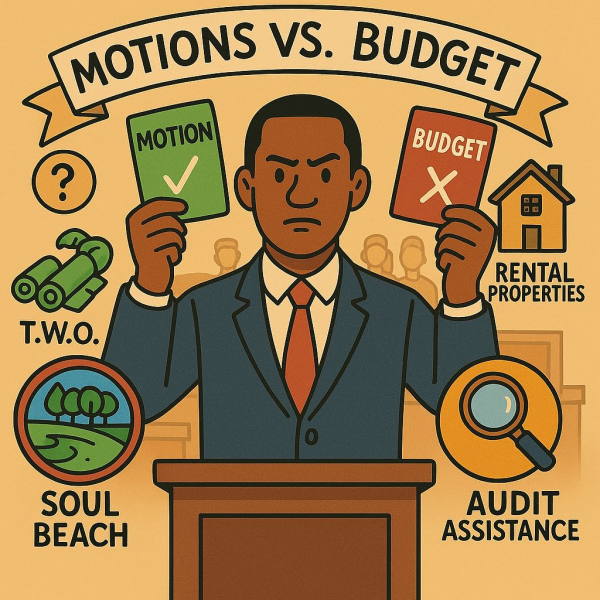 Dear Editor,
Dear Editor,
Recent parliamentary debates have raised important questions about the practice of Members of Parliament voting in favor of a motion while opposing the national budget. This is neither contradictory nor unprecedented. In Sint Maarten’s parliamentary democracy, such actions reflect issue-based decision-making rooted in constitutional responsibility, legal oversight, and a commitment to the people.
Motions serve as targeted instruments to address specific concerns or call for government action on defined issues. One such motion, recently approved by Parliament, mandates the General Audit Chamber to conduct a formal audit into the government’s financial and in-kind support for the Soul Beach event. This decision followed widespread concern over violations of the Subsidy Ordinance and public finance laws. By supporting this motion, Parliament is exercising its right to demand transparency and accountability in public spending.
At the same time, the national budget represents the government’s overarching financial blueprint for the entire fiscal year. It includes projected revenues, expenditures, and policy priorities. A vote on the budget is a vote on the government’s total financial direction. Supporting a motion to address a specific problem does not require endorsing a flawed budget that reflects broader shortcomings in planning, transparency, and execution.
There are concrete reasons why a Member of Parliament may support certain motions while voting against the budget. The Minister of Finance herself acknowledged during budget discussions that several entities had been paid without an approved budget and stated publicly that this practice needed to be corrected. Yet, despite this admission, those same entities were still not included in the 2025 budget, raising serious concerns about fiscal accountability and legal consistency.
In addition, Parliament has yet to receive the full and updated list of government rental properties and the financial obligations attached to them. This information, which should have been disclosed as part of the budget package, remains absent despite multiple formal requests. The lack of transparency on such a fundamental budget item calls into question the completeness and credibility of the document.
Further concerns have arisen from the exclusion of numerous capital projects financed through the T.W.O. Dutch funding programs. These are projects that have already received approval and international support, yet they remain unaccounted for in the national budget. Their absence will likely lead to additional delays in delivery, undermining national development and raising questions about the government’s coordination and readiness.
Meanwhile, the handling of the Soul Beach event has cast a shadow over public finance management. The government’s significant support for this private initiative, carried out without the proper legal foundation, has drawn criticism from Parliament, civil society, and the public. That the budget made no attempt to reconcile or correct this approach further justified the need for formal audit intervention, as now mandated through an approved motion.
It is important to note that this approach is not new. Over the past decade, both coalition and opposition MPs in Sint Maarten have exercised their right to support individual motions while withholding support from the national budget when that budget failed to meet basic standards of transparency, legal compliance, or sound governance. This practice is part of healthy parliamentary oversight and is a vital check within the democratic process.
Supporting a motion is an act of targeted agreement with a solution. Opposing a budget, in contrast, can be a principled response to systemic flaws. Members of Parliament are not elected to simply validate government proposals but to critically assess them in the interest of the people. Under these circumstances, voting against the budget is not obstruction. It is responsible, necessary, and rooted in the constitutional role of Parliament to hold the government accountable.
MP Ardwell Irion.